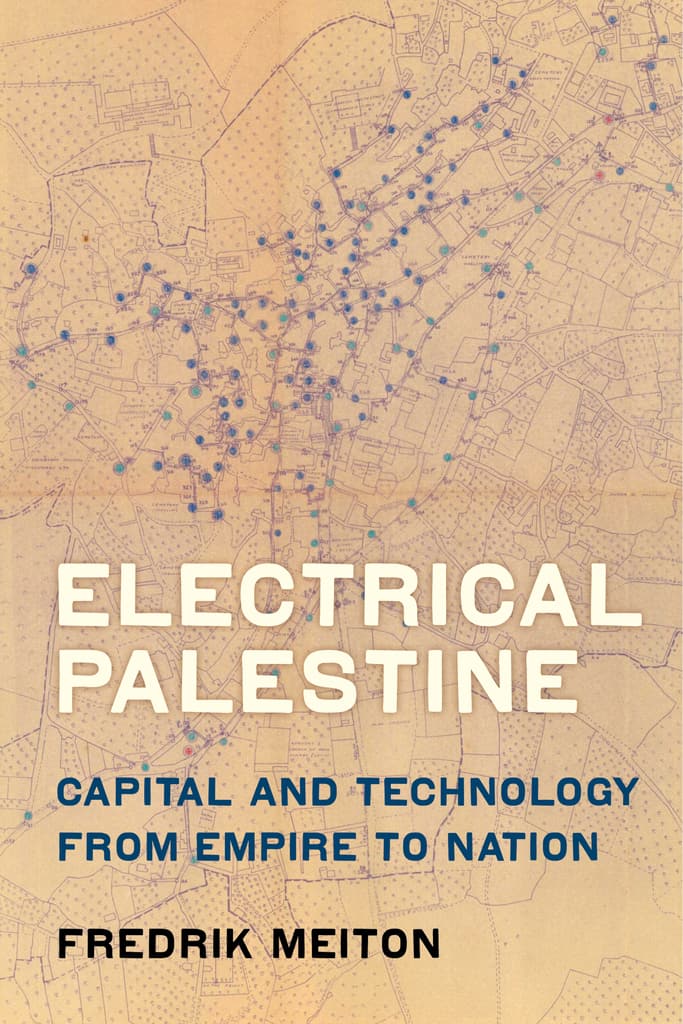This guest post is published as part of our blog series related to the Middle Eastern Studies Association annual meeting November 15-18 in San Antonio, TX. #MESA2018
By Fredrik Meiton, author of Electrical Palestine: Capital and Technology from Empire to Nation
 My new book, Electrical Palestine, is about an electric grid. Nobody is more surprised about this than me. As with so many books, this was not the book I had originally set out to write. A few years ago, at the National Library in Jerusalem, I was leafing through old issues of Filastin, the largest Arab-language newspaper of the interwar period. I came across an unsigned opinion piece from 1932, in which the writer charged that “if Rutenberg electricity lights the city of Nablus and Tulkarm one can say that Rutenberg and his works have conquered that land.”
My new book, Electrical Palestine, is about an electric grid. Nobody is more surprised about this than me. As with so many books, this was not the book I had originally set out to write. A few years ago, at the National Library in Jerusalem, I was leafing through old issues of Filastin, the largest Arab-language newspaper of the interwar period. I came across an unsigned opinion piece from 1932, in which the writer charged that “if Rutenberg electricity lights the city of Nablus and Tulkarm one can say that Rutenberg and his works have conquered that land.”
Rutenberg, it is true, was Jewish, and his project enjoyed the support of several Zionist bodies. But inasmuch as Rutenberg was known to scholars at all, it was through works that extolled his great engineering prowess and refusal to let politics interfere with or influence his work. Why did this Palestinian writer regard the expansion of the grid as a form of Zionist conquest? And more important, at least to me, was he right to?
Once I started looking for Rutenberg’s grid in the historical record, I found it everywhere: I found Chaim Weizmann, later the president of the Zionist Organization, making the rounds in London during World War I, promising “moral industrial progress” in return for British support for Jewish statehood in Palestine. I found one British government memo after another holding forth as if electric grids had the power to single-handedly bring about peace and prosperity. One Middle East Department official predicted that Rutenberg’s grid would “do more than anything else to pacify Palestine, facilitate immigration, and develop the country.”
I quickly realized that Rutenberg’s grid, even in gestation as a rough schematic, occupied a prominent role not just in deliberations over British Palestine policy, but also in a globe-spanning conversation about civilization and development. As early as 1922, before a single watt had been generated or wire strung up in Palestine, the former president of the American Society of Civil Engineers suggested that Rutenberg’s scheme should be exported to “other centers of strife” around the world, given its power to “wipe out hatred of race and creed.” Engineers in Germany, Norway, Italy, and Britain confidently asserted that Rutenberg’s grid would usher in “moral and material progress,” making the country safe for civilization.
In other words, it quickly became apparent to me that there was real political power flowing through these global networks of experts, bureaucrats, and statesmen, and that the power flowed seamlessly into the wires and generators of the grid itself, moving along with the charged particles into industry, agriculture, public space, and private households. As a result, the electric grid and the Jewish state evolved through a mutual dependency.
Consider this. Over the course of the mandate period, the number of Jews in Palestine grew ten times, while the Palestinian population doubled. Palestine’s economy grew eleven times; over three-quarters of that growth occurred in the Jewish sector. Fixed capital, meanwhile, grew 15 times in the Jewish sector, while the corresponding figure on the Palestinian side is 2.5. In other words, Jewish commercial infrastructure grew faster – and more – than anything else, both in absolute terms and relative to the Palestinians. Put another way, the Jewish state of Israel was infrastructural before it was anything else.
It’s always seemed to me that the Palestine mandate poses one question above all to the historian: Why were the Jews successful in getting a state and why were the Palestinians not? The answer will of course involve a great deal of local specificity. Still, I think a good answer will also limn bigger questions about colonialism and what comes after. The article in Filastin sent me down a path I couldn’t have imagined, by suggesting that electric grids make for most excellent cipher keys to cryptic pasts. A few years out from that initial discovery, I’ve come to think that no political process can be properly understood without seriously considering the way material regimes mediate human thought and action and distribute costs and benefits.


